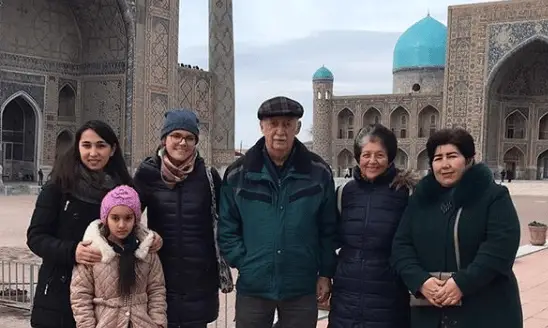The global health crisis has changed life around the world, but in often very different ways in various places. Even countries located close to each other have adopted very different quarantine policies. Having previously traveled in Central Asia and the Caucuses, I gathered some information from acquaintances I’ve made in Kyrgyzstan, Uzbekistan, and Armenia to see how these restrictions differed and to find out how people have been spending their time under quarantine.
Kyrgyzstan
Kyrgyzstan began its quarantine on Saturday, March 21, just three days after recording its first cases, ordering all citizens to shelter in place. One may leave one’s home to visit a grocery store or pharmacy within 1.5 kilometers of one’s home or to walk one’s dog within a 100 meter range. For other trips, special permission must be obtained from the government. Gatherings are limited to no larger than three people, excluding family members. Masks while outside are obligatory; not wearing one carries a 1000 som ($14) fine. Personal identification must be carried at all times.
In a discussion on April 3, 2020 with my friend Aiza, also from Bishkek, who is graduating with her Bachelor’s degree this year:
How are you spending your quarantine?
Aiza: I love sleeping and I’m really good at it. I can sleep all day. So, I’ve spent a lot of time sleeping in. I’ve spent a lot of time watching dumb videos on Instagram. I have work I actually need to get done related to school, like studying and applying for different things, but I keep putting it off. But basically, I’m sleeping a lot and spending a lot of time on the Internet and social media.
Has the quarantine affected your plans?
Aiza: I had plans to go to Italy this year to study for my Master’s. I had been accepted to my program and everything. But now I don’t know if any of that’s going to happen. We’ll see. I’m hoping for the best.
In a discussion with another friend, Alina, from Bishkek on March 20, 2020:
How have you been spending your time during the quarantine?
Alina: Just like many Kyrgyz people, my family and I have been cooking a lot. I love movies, so I’ve been watching those even more than I usually do. I’ve also been taking walks outside early in the morning on weekends. Since we have an 6 PM curfew, it’s much easier to do this in the morning rather than later on in the day. Usually nobody stops us or asks us where we’re going. I don’t think it’s as strict as it seems. But it’s strange seeing the streets so quiet. You can finally see the mountains every day. The air is so clear now.
Postscript: On Sunday, May 10, Kyrgyzstan ended its national state of emergency. The curfew has been lifted and people are now permitted to move freely outside. However, public transportation remains limited and there still few cars on the street. Few private taxis are reported to be working during this time. Only official taxis have been spotted around town. Many establishments resumed business mostly as normal, however, with precautions. Masks while outside are still obligatory and the fine is the same. Bazaars have reopened as have many beauty salons. Cafes, however, are offering takeout only. As of May 29, 2020, Kyrgyzstan has 1,594 confirmed cases of Covid-19 the country with 1,066 confirmed recoveries and 16 confirmed deaths.
Uzbekistan
Uzbekistan began its lockdown on Sunday, March 22, one week after its first case was identified. Like most larger countries, Uzbekistan’s response has been regionalized, with red, yellow, and green zones declared and differing restrictions declared within those zones. Some of the most active measures were declared in Tashkent, the capital and largest city. All public transport shut down, including the subway, buses, and mini-bus services. Taxis operate only with a government-issued disinfection certificate. Recreational facilities in the nearby mountain regions closed but no restrictions were placed on personal hiking. Police have the right to stop vehicles that they feel are on the road unnecessarily. Restaurants, cafes, karaoke centers, and other entertainment centers are closed, but food delivery is still available and grocery stores remain open. All public gatherings have been banned and schools remain in vacation status. On March 25th, the government began requiring the use of face masks in public. The fine for violating this is $22 for the first offense and $67 for repeat offences.
In speaking with a friend from Samarkand on May 17:
How is your situation with the quarantine? Has it been lifted as it has been already in other parts of Central Asia?
Maftuna: For us, not at all. In fact, quite the contrary. It’s very strict. We have what they refer to as a red zone here in Samarkand, where many sick people are gathered. Our quarantine hasn’t been lifted yet and I don’t think it will be until we have absolutely no more infected people remaining. But right now, the number of infected people keeps rising. I think that opening things up soon is very unrealistic for us at this point.
Postscript: As of May 29, Uzbekistan remains in a state of emergency with stay at home orders still in effect. Quarantine measures are due to remain in effect until at least June 25 in the Tashkent region. In contrast to Kyrgyzstan, Uzbekistan is larger and more densely populated, and thus it makes sense that it has been taking longer to get the situation under control, despite strict protocols. Tashkent is more than twice the size of Kyrgyzstan’s capital, Bishkek. As of May 29, Uzbekistan has 3,444 confirmed cases with 2,694 confirmed recoveries and 14 confirmed deaths.
Armenia
Armenia recorded its first case of COVID on March 1. Quarantine restrictions were enacted only on March 23, following a State of Emergency declared on March 16. Schools and universities closed. Events with more than 20 people were prohibited. To go outside, individuals are required to carry a passport and government form granting them permission to leave their homes. Masks are obligatory, enforced by fines of 10,000 drams ($20). Screening and testing are now widespread. Armenia has closed its borders, including land borders, to all except Armenian citizens, residents, or their family members. Upon entry into Armenia, travelers must complete health questionnaires and self-quarantine for 14 days.
In an interview with – Zara, and her son, Mher on April 9, 2020:
What have your restrictions been like in Armenia during this time?
We don’t have any restrictions with how far away you can go grocery shopping from your house, but if you’re walking a dog, you can walk as far as 500 meters from your house.
Is everyone at the store wearing a mask?
Most people are, but not everyone, no. We’ve heard that everyone in America is buying all of the toilet paper.
Yes. This is true. Do you have any items like that, that people are hoarding?
No. We don’t. We definitely have enough toilet paper.
What about prices? Are they going up?
We only have some price increases for certain products, especially those that are imported from Iran. We are also running low on flour.
In an interview with another friend from Armenia on April 9, 2020:
Armenians are very social people. Is it hard for people not to go to other people’s houses, especially their family members?
Lilit: Yes. Armenians are very outgoing and emotional, and love to spend time with each other, but this situation has made us very humble, because we’re afraid. But people have altered their style of communication. For instance, calling each other and video chatting has become very popular for us, especially in the evenings.
As an English speaker, I understand you’re in contact with some English-speakers in the expat community. Have many expats returned back to their own countries?
Lilit: Some have, but not all. Some have made Armenia their home, and have nothing left to return to in America, so they’ve chose to stay here, despite the situation.
How is the situation looking as things continue?
Lilit: You see the problem is many Armenians aren’t taking it very seriously. Some believe that Coronavirus doesn’t even exist. For that reason, they aren’t taking extra precautions, which is why it’s continuing to spread here. Even though we have strict regulations in place with wearing a mask, people aren’t listening.
Postscript: As of May 4, 2020, the Armenian government has lifted many restrictions for businesses and personal mobility, including the need to gain government permission to leave the house. Although the quarantine measures were lifted, on May 14, Armenia’s State of Emergency was extended for 30 more days, through June 13, 2020. Schools and universities remain closed. As of May 18, the ban on public transportation was lifted. Many additional establishments reopened including pre-schools, shopping malls, gyms, restaurants and cafes. Masks and gloves are still required on public transport and in public spaces. The land border closure between Georgia and Armenia has been extended indefinitely. As of May 27, 2020, Armenia has 7,774 confirmed cases of Covid-19 the country with 3,255 confirmed recoveries and 98 confirmed deaths.



